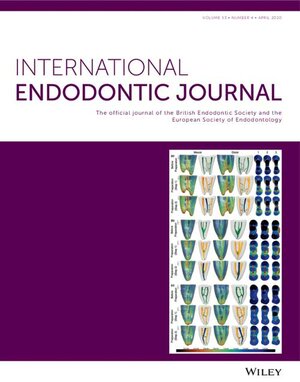Clinical efficacy of root canal treatment at 2 years using a new ready-to-use injectable calcium silicate-based sealer: A multicentric randomised controlled trial
Abstract
Aim
Calcium silicate-based sealers (CSSs) have gained popularity in endodontic applications primarily due to their biological properties and ease of use. This study aimed to assess the 24-month efficacy and safety of root canal treatment using a new injectable CSS, BioRoot™ Flow, and to demonstrate the non-inferiority compared to the established hand-mixed BioRoot™ RCS.
Methodology
This was a multicentric, prospective, randomised, assessor-blinded, controlled, non-inferiority trial (ClinicalTrials.gov: NCT04757753). Patients requiring a primary or a secondary root canal treatment on a single or multi-rooted tooth were block randomly assigned to BioRoot Flow or BioRoot RCS groups. The primary outcome was the 24-month success rate based on clinical and radiological criteria. Secondary outcomes included the 6- and 12-month success rates based on similar radiological and clinical criteria, quality of obturation, resorption of extruded material in case of overfilling assessed at 6, 12 and 24 months, post-operative pain measured using the Visual Analog Scale (VAS) at baseline, 12 h, 24 h, 48 h, 72 h and 7 days, and occurrence of adverse events. A subgroup analysis was also performed based on the type of treatment and on the presence or absence of apical periodontitis (AP) at baseline. Non-inferiority between materials was assessed using Dunnett and Gent's Chi-squared (χ2) test, based on an initial hypothesis with a non-inferiority margin set at 13%, an 80% power and a 5% one-sided alpha risk. Investigators and patients were not blinded to the assigned medical device. Two qualified evaluators performed a blinded independent central review of the retro-alveolar radiographs.
Results
A total of 160 patients with a mean age of 48 years were treated (77 in BioRoot Flow and 83 in BioRoot RCS). The 24-month follow-up rate was 85.6%. The overall 24-month success rates were 86.6% and 87.7% (p = .0195), respectively. No significant differences were observed between the groups regarding any of the considered secondary outcomes. No adverse events were reported.
Conclusion
This study demonstrated the non-inferiority of the new injectable CSS (BioRoot Flow) compared to the previous hand-mixed version (BioRoot RCS) in terms of efficacy and safety, supporting the implementation of the new material in clinical practice.

 求助内容:
求助内容: 应助结果提醒方式:
应助结果提醒方式:


